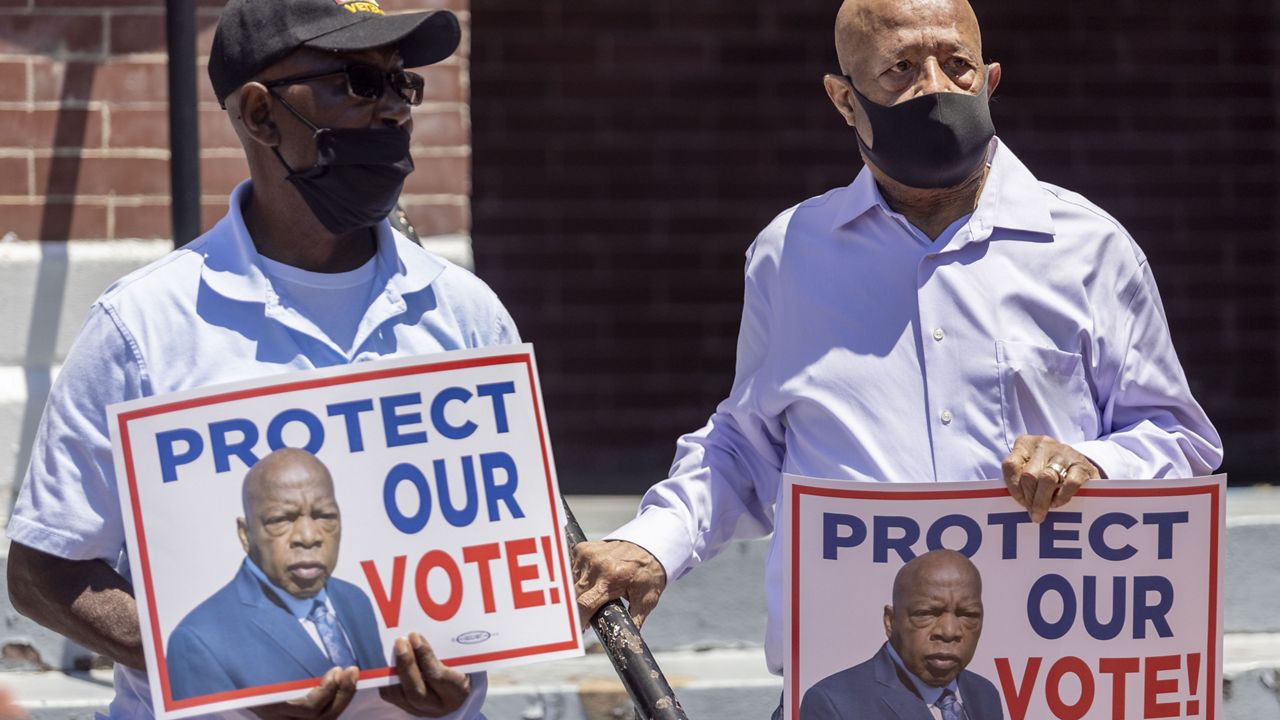House Democrats introduced H.R. 4, better known as the John Lewis Voting Rights Advancement Act, on Tuesday, a critical piece of legislation in their plan to protect voting rights in the face of restrictive measures being enacted by Republicans in statehouses nationwide.
Named for the late Georgia Congressman and staunch voting rights advocate, the bill aims to restore the power of the Voting Rights Act of 1965, as well as “expand federal oversight to prevent voter discrimination and suppression” and allow the Department of Justice the ability to “challenge potentially discriminatory voting rules before they are implemented and proactively protect the freedom to vote.”
Alabama Rep. Terri Sewell, who served as the chief author of the bill, spoke about the measure while standing in front of the Edmund Pettus Bridge in Selma, Alabama, the site of the Bloody Sunday conflict in 1965, where police attacked Civil Rights Movement protesters trying to march from Selma to Montgomery, the state’s capital. Lewis led one of the marches from Selma to Montgomery, and was beaten by Alabama state troopers.
“The right to vote is the most sacred and fundamental right we enjoy as American citizens and one that the Foot Soldiers fought, bled, and died for in my hometown of Selma, Alabama,” Sewell said in a statement Tuesday.
“Today, old battles have become new again as we face the most pernicious assault on the right to vote in generations. It’s clear: federal oversight is urgently needed,” she said.
According to the Brennan Center for Justice, between January and July of 2021, eighteen states have enacted laws which restrict access to the ballot box, including more than a dozen Republican-led states. Many lawmakers have enacted restrictive voting measures in the wake of former President Donald Trump's baseless claims of fraud in the 2020 presidential election.
There is no evidence of widespread fraud in the 2020 presidential election, a statement that has been backed up by a number of officials, including Trump's own attorney general William Barr.
“By preventing states with a recent history of voter discrimination from restricting the right to vote, this bill restores the full promise of our democracy and advances the legacy of those brave Foot Soldiers like John Lewis who dedicated their lives for the sacred right to vote,” she said of the bill. “I’m proud to be introducing this bill today and look forward to its swift passage. Our democracy is at stake.”
The measure is widely expected to pass the House, where the Democrats control a thin majority. Earlier this year, the House passed a more sweeping voting rights and election reform package, the For the People Act, but Senate Republicans blocked the measure.
It’s unclear whether this bill will garner enough bipartisan support to pass the Senate. Only one Republican — Alaska Sen. Lisa Murkowski — has thus far expressed support for a bill that would restore the provisions of the Voting Rights Act. Murkowski was also the lone Republican to co-sponsor a similar bill during the last Congress.
The bill’s introduction comes one day after Kristen Clarke, the head of the Justice Department’s civil rights division, urged Congress to pass legislation to protect the right to vote, saying that “voting rights are under pressure to an extent that has not been seen since the Civil Rights era.”
“We have seen an upsurge in changes to voting laws that make it more difficult for minority citizens to vote and that is even before we confront a round of decennial redistricting where jurisdictions may draw new maps that have the purpose or effect of diluting or retrogressing minority voting strength,” Clarke said.
The bill enjoys the universal support of House Democratic leadership. House Speaker Nancy Pelosi said in a statement that “Democrats plan to pass” the measure when the House returns on Aug. 23 to consider a $3.5 trillion budget resolution and the $1 trillion bipartisan infrastructure bill.
“With the John R. Lewis Voting Rights Advancement Act … Democrats are fighting back against an anti-democratic tide, protecting access to the ballot box for every American and carrying on the cause to which our beloved John Lewis devoted his entire life,” Pelosi continued.
“Across the country, we continue to bear witness to GOP attacks on voting rights with restrictive laws and voter-ID rules to prevent people of color, students, and others from having their voices heard at the ballot box,” House Majority Leader Steny Hoyer said. “H.R. 4 takes the necessary steps to respond to the flawed Supreme Court challenges to the 1965 Voting Rights Act, and ensures federal standards to stop these dangerous laws in their tracks."
“House Democrats will not falter in the fight for the right to vote, and we remain committed to ensuring our democracy can prosper and continue to deliver for the people,” he concluded.



